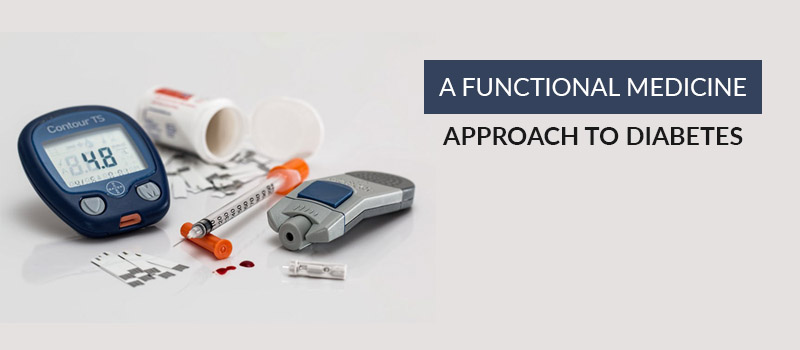
As someone who was diagnosed with type 1 diabetes shortly after turning 21, I’m all too familiar with how overwhelming it can be and how steep the learning curve may appear. I have always considered myself a healthy guy – I work out 6 days a week, play sports and watch what I eat – but even that was not enough to prepare me for my diagnosis as a Type 1 Diabetic. I had to completely re-learn how to eat, manage my blood sugar levels, and I learned more about nutrition than I thought was even possible. In addition to being mindful of my diet, I had to implement a regular physical exercise schedule to keep my glucose levels within a healthy range throughout the day. I’m writing this to let you know that, even though it may feel overwhelming, it is possible to live a healthy & happy life with Diabetes. Through my own experience, I have compiled a list of tips that work for me to help regulate blood glucose levels and keep them within a healthy range.
Functional Medicine has played a key role in the successful management of my diabetes and maintaining healthy blood glucose levels. Because Type 1 diabetes is an autoimmune disease, you must make sure to address all aspects of health to keep your immune system functioning well and in good shape. While traditional medicine focuses on treating the symptoms at hand, the Functional approach looks at all aspects of health, including mind, body, spirit- and in dealing with diabetes, focuses on good immune function. The Functional approach also adheres to the fact that “food is medicine”, and as a diabetic I know how important nutrition and eating well is for maintaining healthy glucose levels. I also like to regularly test my nutrient levels through diagnostics to ensure my nutritional levels are where they should be. I’ve used the Spectracell Micronutrient Panel as it’s a great way to check my overall nutritional and immune status and find areas that may need improvement.
The most important piece to maintaining healthy glucose levels is educating yourself on nutrition, improving your nutritional literacy and being mindful of the foods you consume in your diet. I went from never reading nutrition information to reading the label on everything I ate and meticulously counting my macros. The average person’s diet is rich in carbohydrates and often people eat too many carbs on a regular basis. When you are a type 1 and dependent on exogenous insulin it is imperative to both limit carb intake and to eat the correct types of carbohydrates to promote stable and healthy blood sugar levels. Diving even deeper, you must learn the difference between simple carbohydrates and complex carbohydrates, as each Affects blood glucose levels differently. An example of a simple carb would be a slice on white bread (think wonder bread) or cake, and an example of a complex carbs would be brown rice or oats. Simple carbohydrates are processed and metabolized much quicker, therefor having a much higher affinity to shoot blood glucose levels up within 15-30 minutes of eating. Due to the quick and sudden spike in blood glucose levels simple carbohydrates cause, it can be easy to end up with above normal or below normal glucose levels after eating ( if too much insulin is used to correct the high spike after eating). It can also make it more difficult to maintain stable blood glucose levels throughout the day. This is due to the initial spike after eating or the simple carbohydrates leaving your system quicker than the insulin, leaving room for blood glucose crashes(hypoglycemia). Complex carbohydrates are processed much slower- think more even and gradual levels. Consuming complex carbohydrates is a much smarter choice as a diabetic for several reasons. First, you will have considerably less glucose spikes or crashes, and can thus keep your glucose levels within a healthy range throughout the day. Second, due to complex carbs being metabolized slower, they can be a great source of fuel for physical activity. Consuming a moderate amount of complex carbs before physical activity can greatly reduce the chances of glucose levels dropping too low, while not spiking it at the same time.
In addition to diet, frequent physical exercise is a must to support health blood glucose levelsand overall health. It has been found that even moderate physical activity directly after eating can lower blood glucose levels and prevent blood sugar spikes, and exercise improves immune function too. According to a study, which involved 41 adults, the results showed that taking shorter, more frequent walks immediately after meals reduced blood glucose by around 12% compared with a single 30-minute walk. The greatest benefit was seen after the evening meal when carbohydrate consumption was high, and participants tended to be less active. Like taking walks, lifting weights in the gym can have similar effects on glucose levels and help reduce post-meal insulin spikes.
The goal is to keep your blood sugar level as close to normal as possible to delay or prevent any complications. Generally speaking, the goal is to keep your daytime blood sugar levels before meals between 80 and 130 mg/dL (4.44 to 7.2 mmol/L) and your after-meal numbers no higher than 180 mg/dL (10 mmol/L) two hours after eating. A fasting blood sugar level less than 100 mg/dL (5.6 mmol/L) is normal. A fasting blood sugar level from 100 to 125 mg/dL (5.6 to 6.9 mmol/L) is considered prediabetes. If it is 126 mg/dL (7 mmol/L) or higher on two separate tests, there is a good chance you may have diabetes. You do not have to completely cut out simple carbs or dessert foods to achieve good balance with carbs, you just need to be mindful and eat them in moderation.
In conclusion, educating yourself on nutrition, implementing frequent physical exercise and sticking to a healthy diet will allow you to keep glucose levels within a healthy range and help you feel healthier and more energized. And it’s critical to maintain a strong immune system, especially now with Covid, cold and flu season. It will take some time to learn how different foods effect your individual glucose levels, but with the help of a good Functional Medicine provider and a nutritionist, you can improve your overall health and manage this disease well.. A healthy lifestyle is achievable- it just takes focus and ownership!
Written by Matthew Slifer
